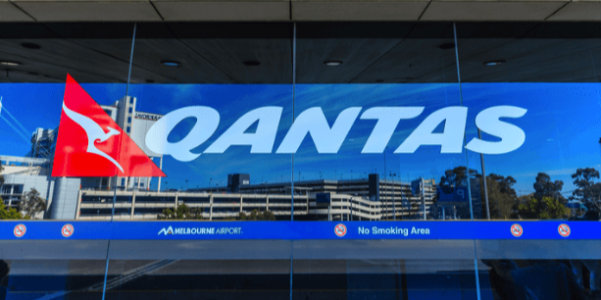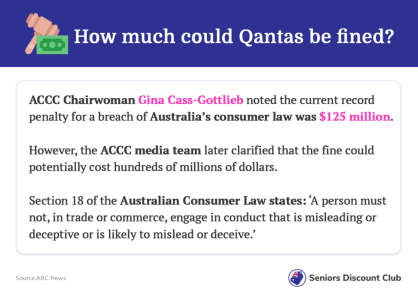Qantas defends its actions in the ACCC 'ghost flights' case as reasonable
- Replies 22
The Australian Competition and Consumer Commission (ACCC) has slapped Qantas with a lawsuit, alleging the airline engaged in misleading and deceptive conduct by continuing to sell tickets for flights they knew would be cancelled.
These so-called 'ghost flights' left thousands of passengers high and dry, with some stranded overseas.
Specialist data analysts discovered that Qantas cancelled almost 25 per cent of its flights between May and July 2022. This equated to roughly 15,000 cancellations out of 66,000 domestic and international flights across Australia.
The ACCC also accused Qantas of keeping cancelled flights available for purchase for more than 48 hours.

Qantas, however, insisted they did nothing illegal. The company had filed a legal defence denying that laws were broken.
In a press release, the airline accused the ACCC of failing to grasp the complex 'realities' of running an airline during a pandemic.
'While mistakes were made by Qantas, the ACCC's legal case ignores the realities of the aviation industry—airlines can't guarantee specific flight times,' said the company.
Qantas clarified that they didn't have 'ghost flights'. They explained that customers who paid for a flight were either provided with a flight or refunded, so there was no 'fee for no service' situation.
They also argued that during the period the ACCC investigated, it was a tough time for everyone due to the challenges of restarting flights after COVID shutdowns, not only for Qantas but the entire industry.
The disruptions were primarily due to COVID-related supply chain issues, which led to grounded aircraft, increased sick leave, and self-quarantine requirements for the airline's staff. To make matters worse, international borders remained uncertain at the time.
'That meant cancelling a lot of flights that were already in the system,' said Qantas, adding that they made these cancellations around two-and-a-half months before the originally planned departure.
'While we restarted safely, we got many other things wrong, and for that, we have sincerely apologised.'
This raises another question: why did it take so long for Qantas to inform customers about their cancelled flights?
Qantas explained that the delays in notifying passengers about flight cancellations were due to their efforts to find alternative options for customers.
'Our priority is always to find alternatives within hours or a day of their original departure time, focusing on those closest to their travel date first,' they said.
Qantas believed that informing customers about the cancellation earlier would have been more frustrating for them. Instead, they chose to wait until they could say, 'Your flight has changed,' rather than 'Your flight has been cancelled.'
To prevent similar issues from happening again, Qantas has made important changes. Now, when a flight is cancelled, it is promptly removed from sale, well within the 48 hours mentioned in the ACCC case.
This process is currently manual and wasn't feasible during the turbulent times the ACCC examined, given the disruptions. However, Qantas is working on a custom IT solution to automate this process, which would integrate with their third-party system.
After facing a slew of negative news following the pandemic, Qantas underwent major leadership changes.
After former CEO Alan Joyce's tenure ended, Chairman Richard Goyder announced he was stepping down due to ongoing problems and investor criticism.
Olivia Wirth, the CEO of Qantas Loyalty, is also leaving the company in February to explore new opportunities after five years in her role.

Members, what are your thoughts on this recent news regarding Qantas?
Were you, like many others, affected by the cancelled flights? Do you agree that the airline provided replacement flights and refunds to affected customers?
We'd love to read your opinions and experiences, so please share them in the comments section below!
These so-called 'ghost flights' left thousands of passengers high and dry, with some stranded overseas.
Specialist data analysts discovered that Qantas cancelled almost 25 per cent of its flights between May and July 2022. This equated to roughly 15,000 cancellations out of 66,000 domestic and international flights across Australia.
The ACCC also accused Qantas of keeping cancelled flights available for purchase for more than 48 hours.

Qantas has responded to the ACCC's accusation that it ripped off thousands of consumers last year. Credit: Shutterstock.
Qantas, however, insisted they did nothing illegal. The company had filed a legal defence denying that laws were broken.
In a press release, the airline accused the ACCC of failing to grasp the complex 'realities' of running an airline during a pandemic.
'While mistakes were made by Qantas, the ACCC's legal case ignores the realities of the aviation industry—airlines can't guarantee specific flight times,' said the company.
Qantas clarified that they didn't have 'ghost flights'. They explained that customers who paid for a flight were either provided with a flight or refunded, so there was no 'fee for no service' situation.
They also argued that during the period the ACCC investigated, it was a tough time for everyone due to the challenges of restarting flights after COVID shutdowns, not only for Qantas but the entire industry.
The disruptions were primarily due to COVID-related supply chain issues, which led to grounded aircraft, increased sick leave, and self-quarantine requirements for the airline's staff. To make matters worse, international borders remained uncertain at the time.
'That meant cancelling a lot of flights that were already in the system,' said Qantas, adding that they made these cancellations around two-and-a-half months before the originally planned departure.
'While we restarted safely, we got many other things wrong, and for that, we have sincerely apologised.'
This raises another question: why did it take so long for Qantas to inform customers about their cancelled flights?
Qantas explained that the delays in notifying passengers about flight cancellations were due to their efforts to find alternative options for customers.
'Our priority is always to find alternatives within hours or a day of their original departure time, focusing on those closest to their travel date first,' they said.
Qantas believed that informing customers about the cancellation earlier would have been more frustrating for them. Instead, they chose to wait until they could say, 'Your flight has changed,' rather than 'Your flight has been cancelled.'
To prevent similar issues from happening again, Qantas has made important changes. Now, when a flight is cancelled, it is promptly removed from sale, well within the 48 hours mentioned in the ACCC case.
This process is currently manual and wasn't feasible during the turbulent times the ACCC examined, given the disruptions. However, Qantas is working on a custom IT solution to automate this process, which would integrate with their third-party system.
After facing a slew of negative news following the pandemic, Qantas underwent major leadership changes.
After former CEO Alan Joyce's tenure ended, Chairman Richard Goyder announced he was stepping down due to ongoing problems and investor criticism.
Olivia Wirth, the CEO of Qantas Loyalty, is also leaving the company in February to explore new opportunities after five years in her role.
Key Takeaways
- The Australian Competition and Consumer Commission (ACCC) has filed a lawsuit against Qantas, alleging the airline sold tickets on cancelled flights from May to July last year.
- Qantas has denied breaking the law and accused the commission of failing to understand the 'reality' of the airline industry.
- In its defence, Qantas states that customers were offered alternative flights or refunds and denied the notion of 'ghost flights'.
- Qantas has made changes to take cancelled flights off sale immediately and ensure affected domestic passengers are offered same-day flights departing within an hour of their scheduled time.
Members, what are your thoughts on this recent news regarding Qantas?
Were you, like many others, affected by the cancelled flights? Do you agree that the airline provided replacement flights and refunds to affected customers?
We'd love to read your opinions and experiences, so please share them in the comments section below!








